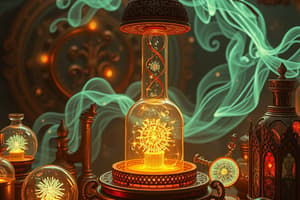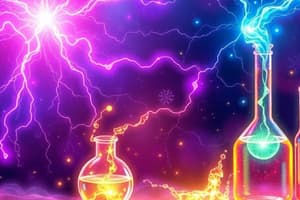Podcast
Questions and Answers
What is the process of removing electrons from the solution at the anode called?
What is the process of removing electrons from the solution at the anode called?
Anodic electrolysis
What is the main product of the electrolysis of water?
What is the main product of the electrolysis of water?
Hydrogen gas (H2)
Name one practical application of electrolysis in the production of a metal.
Name one practical application of electrolysis in the production of a metal.
Aluminum extraction
What is a major challenge faced by electrolysis in terms of energy consumption?
What is a major challenge faced by electrolysis in terms of energy consumption?
In the chlor-alkali process, what compound is electrolyzed to produce chlorine?
In the chlor-alkali process, what compound is electrolyzed to produce chlorine?
What is the major product formed when phenol reacts with methyl chloroformate in the presence of NaOH?
What is the major product formed when phenol reacts with methyl chloroformate in the presence of NaOH?
What does phenol form when it reacts with Br2?
What does phenol form when it reacts with Br2?
What is the major product obtained when phenol is treated with CO2 in the presence of NaOH followed by acidification?
What is the major product obtained when phenol is treated with CO2 in the presence of NaOH followed by acidification?
What is the product formed when compound X is treated with (CH3CO)2O in the presence of catalytic amount of H2SO4?
What is the product formed when compound X is treated with (CH3CO)2O in the presence of catalytic amount of H2SO4?
Which of the following alcohols has the lowest solubility in water?
Which of the following alcohols has the lowest solubility in water?
Which compound exhibits the maximum extent of hydrogen bonding?
Which compound exhibits the maximum extent of hydrogen bonding?
Which of the following alcohols is the most soluble in water?
Which of the following alcohols is the most soluble in water?
What is the major challenge faced in allyl alcohol synthesis from glycerol and oxalic acid?
What is the major challenge faced in allyl alcohol synthesis from glycerol and oxalic acid?
Describe the synthesis process of diethyl ether from 2CH3CH2OH.
Describe the synthesis process of diethyl ether from 2CH3CH2OH.
How does the Lucas reagent react with alcohols?
How does the Lucas reagent react with alcohols?
Study Notes
Electrochemistry: Exploring the Fascination of Electrolysis
Electrochemistry is a fascinating interdisciplinary field that combines chemistry and electricity, delving into the interactions between charged particles in chemical reactions that occur at the interface of an electrode and a solution. One of the most fascinating and practically relevant aspects of electrochemistry is the process of electrolysis, which involves the use of electric current to drive chemical reactions.
Electrolysis: The Basics
Electrolysis is the process of using an electric current to split water, dissolved salts, or molten salts into their constituent elements or compounds. At its core, electrolysis entails the following steps:
- Applying an electric current: A power source, such as a battery or an external power supply, delivers an electric current through an electrolyte.
- Reduction and oxidation: The electric current causes reduction (gain of electrons) and oxidation (loss of electrons) reactions at the electrodes, which are typically made of materials that do not participate in the reactions themselves, like platinum or graphite.
- Product formation: The reduction and oxidation reactions at the electrodes lead to the formation of desired products, such as hydrogen (H₂), oxygen (O₂), metals, or other useful compounds.
Types of Electrolysis
Electrolysis can be broadly classified into two types:
- Anodic electrolysis: During this process, electrons are removed from the solution, leading to oxidation reactions at the anode.
- Cathodic electrolysis: Electrons are added to the solution, leading to reduction reactions at the cathode.
Electrolysis of Water
One of the most well-known applications of electrolysis is the electrolysis of water, a process that produces hydrogen and oxygen gas. The half-reactions are as follows:
Anode (oxidation): (2H_2O \rightarrow O_2 + 4H^+) Cathode (reduction): (2H^++ 2e^- \rightarrow H_2)
The overall reaction is: (2H_2O \rightarrow 2H_2 + O_2)
Industrial Applications
Electrolysis has numerous practical applications, some of which include:
- Hydrogen production: Hydrogen is an energy-rich molecule that can be used to produce electricity in fuel cells. Electrolysis is an efficient way to produce hydrogen from water, using renewable energy sources such as solar or wind power.
- Chlorine production: Chlorine is produced through the electrolysis of sodium chloride (NaCl) in a process called the chlor-alkali process. This process is a major source of chlorine and caustic soda (NaOH) worldwide.
- Metal extraction: Electrolysis is used to extract metals from their compounds. Aluminum, for instance, is produced through the electrolysis of molten aluminum oxide (Al₂O₃) in a process called the Hall-Héroult process.
- Battery recycling: Electrolysis is used to recover valuable metals from spent lithium-ion batteries.
Challenges and Future Prospects
While electrolysis has numerous applications, it also faces several challenges, such as:
- Energy efficiency: Electrolysis can be an energy-intensive process, making it less competitive in terms of energy efficiency compared to other processes.
- Cost: The high cost of electrolysis equipment and the energy required to run the process can be major obstacles to its widespread use.
- Scalability: Electrolysis processes need to be scalable to meet industrial demands without compromising efficiency or safety.
Future research efforts and technological development are focusing on reducing the energy consumption and costs associated with electrolysis processes to make them more sustainable and competitive with traditional methods.
Electrolysis is a fascinating and dynamic field, offering numerous opportunities for innovation and the development of new technologies. As we continue to explore the boundaries of electrochemistry, electrolysis will undoubtedly play a critical role in shaping our future energy and material production systems.
Studying That Suits You
Use AI to generate personalized quizzes and flashcards to suit your learning preferences.
Description
Explore the captivating world of electrolysis in electrochemistry, where electric current drives chemical reactions to split compounds into their component elements. Learn about the basics, types, applications, challenges, and future prospects of this intriguing process.




